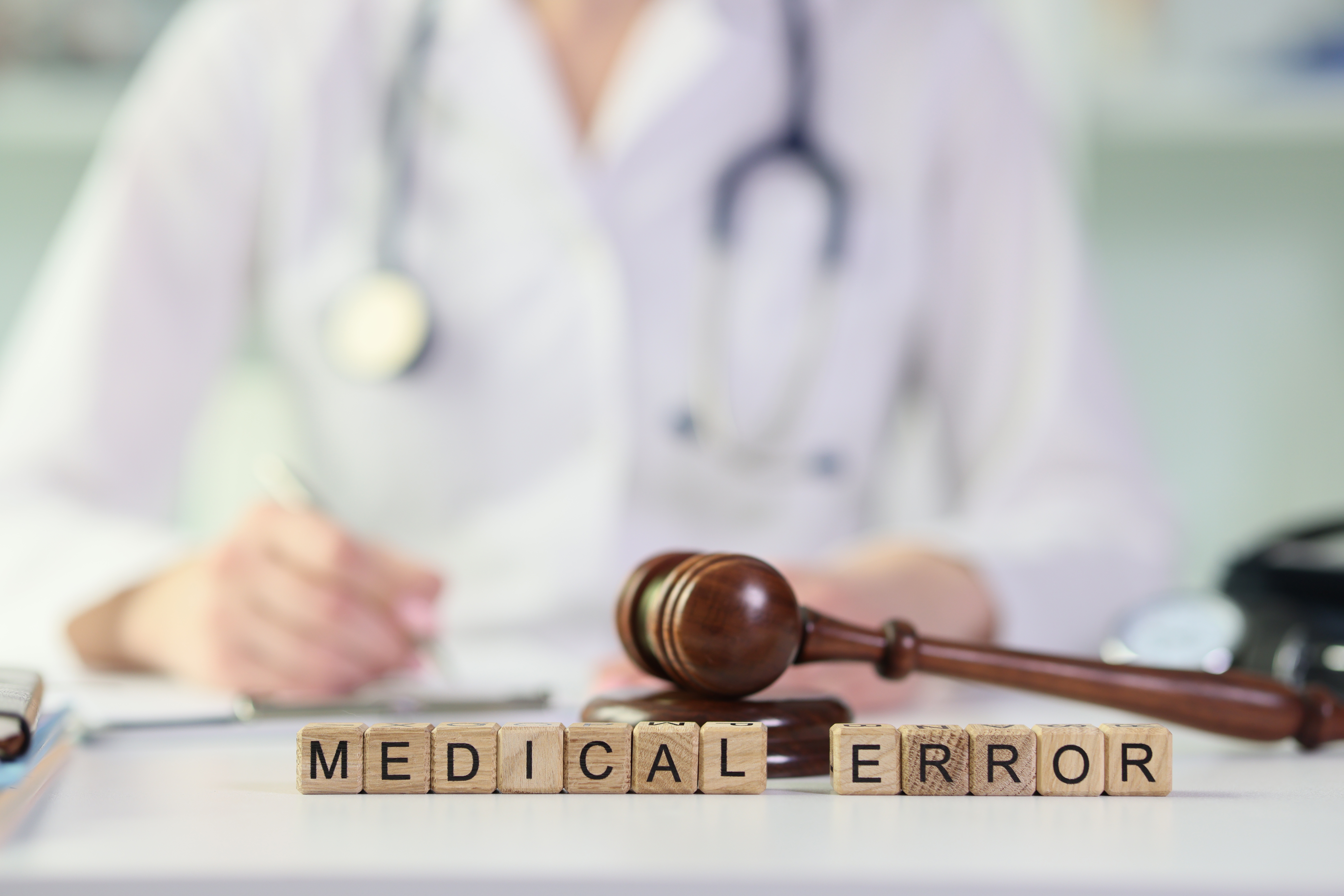What Qualifies as a Medical Error?
Gregg Hollander | December 11, 2024 | Medical Malpractice

Medical errors damage thousands of lives each year, often leaving patients and families to cope with the aftermath of preventable harm. When healthcare providers make mistakes that fall below the accepted standard of care, the resulting injuries may provide grounds for a medical malpractice lawsuit.
However, not all medical errors qualify as malpractice—distinguishing between an honest error and negligence requires careful legal examination.
This guide explores the types of medical errors that may constitute malpractice and the invaluable role of a Boca Raton medical malpractice attorney in seeking justice.
Understanding Medical Errors: Definition and Types
A medical error is defined as a preventable adverse effect of medical care, whether evident or harmful. These errors range from minor oversights to serious mistakes with long-term health consequences.
Medical errors occur in hospitals, clinics, and nursing homes, and can result from miscommunication, equipment malfunction, or human error.
There are two primary categories of medical errors:
- Errors of Commission: These occur when a healthcare provider actively does something wrong, such as prescribing the wrong medication.
- Errors of Omission: These occur when necessary actions are not taken, such as failing to diagnose a condition promptly.
Common Medical Errors That May Qualify as Malpractice
Malpractice must typically involve a breach of the standard of care, meaning the provider acted in a way that a competent professional would not have under similar circumstances. Below are some of the most frequent types of medical errors that may give rise to malpractice claims:
Diagnostic Errors
Diagnostic errors occur when a healthcare provider misdiagnoses or delays a diagnosis, leading to incorrect or delayed treatment. Conditions like cancer, heart disease, and infections often require early and accurate diagnosis for effective treatment.
When a diagnosis error results from negligence—such as ignoring critical symptoms, failing to order necessary tests, or misinterpreting results—it can result in a medical malpractice claim.
Medication Errors
Medication errors are among the most common preventable mistakes in healthcare and can have severe consequences.
Examples include:
- Prescribing or administering the wrong medication or dosage
- Overlooking potential drug interactions
- Failing to consider patient allergies
Medication errors can cause severe reactions or, in extreme cases, lead to fatal overdoses. Patients harmed by medication errors due to negligence may have a case for medical malpractice.
Surgical Errors
Surgical mistakes can have life-altering implications, from infections to permanent disabilities.
Common surgical errors include:
- Operating on the wrong body part
- Leaving instruments inside the body
- Performing the wrong procedure
- Anesthesia-related mistakes
Surgical errors often arise from lack of preparation, miscommunication, or fatigue, and if negligence is proven, victims may be entitled to compensation.
Birth Injuries
Mistakes during pregnancy or delivery can lead to birth injuries, affecting both mother and child.
These may include:
- Delayed C-sections, which can cause oxygen deprivation in infants
- Misuse of forceps or vacuum extractors
- Failure to monitor fetal distress
Birth injury cases can result in long-term health issues for the child. If you prove medical negligence, your family may receive compensation to support ongoing care and treatment.
Failure to Treat or Monitor
After diagnosis, healthcare providers must follow through with appropriate treatment and closely monitor the patient’s progress. Failing to provide adequate aftercare or neglecting follow-up can worsen a patient’s condition.
This type of oversight is common in cases involving chronic diseases, post-surgical recovery, and critical care patients.
Legal Criteria for a Medical Malpractice Claim

Medical malpractice occurs when a healthcare provider’s actions (or lack thereof) fall below the accepted standard of care, resulting in harm to a patient. To succeed in a medical malpractice claim, the party bringing the claim must demonstrate four essential legal elements: duty of care, breach of duty, causation, and damages.
Duty of Care
A medical malpractice claim begins by establishing that a duty of care exists between the healthcare provider and the patient. This relationship exists whenever a medical professional agrees to treat a patient.
Once providers agree to provide care, they assume a legal obligation to deliver services in line with accepted medical standards, ensuring the patient’s safety and well-being to the best of their ability.
Breach of Duty
After proving a duty of care, the claimant must show that the provider breached this duty. Breach of duty occurs when the provider’s actions or omissions fall below the standard expected in their profession.
Your lawyer will evaluate this by comparing the provider’s actions to what a competent, similarly trained medical professional would have done in a similar situation.
For example, failing to diagnose a condition that other doctors in the same field should typically recognize can constitute a breach.
Causation
Next, the claim must establish a direct link between the provider’s breach of duty and the harm the patient suffered. It’s not enough to show that the healthcare provider was negligent; the negligence must have caused the injury. This element requires a lawyer to prove, especially in complex cases where other factors might have contributed to the harm.
Damages
Finally, the patient must have suffered actual damages due to the malpractice. Damages may include physical pain, emotional distress, additional medical expenses, or lost income due to the injury. Without demonstrable harm, a malpractice claim cannot be successful, even if the provider was negligent.
Proving a medical malpractice claim requires meeting these four legal elements. You must clearly demonstrate each element, as failing to prove even one can result in the dismissal of the case.
Understanding these criteria is critical for those considering a malpractice claim, as it highlights the importance of a well-prepared, evidence-backed case. When you hire a reputable medical malpractice attorney, they will work tirelessly to ensure that they can prove each of these elements in your case.
How a Medical Malpractice Attorney Can Help
Medical malpractice cases are often quite complicated, requiring extensive investigation and expert testimony. A skilled medical malpractice attorney can assist in multiple ways, from evaluating the validity of your claim to representing you in court.
Case Evaluation and Legal Guidance
An attorney can review your medical records, consult with experts, and determine if your injury qualifies as malpractice. They’ll explain your rights, outline potential compensation, and guide you through the legal process.
Gathering Evidence and Expert Testimony
Proving a medical malpractice case often requires medical records, witness statements, and expert opinions. Attorneys can secure the necessary documentation, identify credible expert witnesses, and help substantiate the claim by demonstrating how the provider’s actions fell below the standard of care.
Calculating Damages
In a medical malpractice case, damages include:
- Medical expenses: Costs for corrective surgeries, rehabilitation, medication, and long-term care.
- Lost income: Compensation for lost earnings if the patient can’t return to work.
- Pain and suffering: Acknowledgment of emotional trauma and diminished quality of life.
- Future care: Anticipated medical expenses for those with ongoing healthcare needs.
An attorney can calculate and maximize these damages to ensure fair compensation.
Negotiation With Insurance Companies
Insurance companies often attempt to settle claims for minimal amounts. An experienced medical malpractice attorney can negotiate on your behalf, using their understanding of malpractice law and resources to push for a fair settlement.
Preparing for Trial
If you cannot reach a fair settlement, your attorney will represent you in court, presenting evidence and expert testimony to support your claim. You need their experience to handle court proceedings and advocate for you.
Benefits of Contacting a Medical Malpractice Attorney

Hiring an attorney for a medical malpractice claim provides several advantages, including:
- Understanding the Statute of Limitations: Each state has a specific timeframe for injured patients to file malpractice claims. Some jurisdictions may set a shorter deadline than other personal injury cases. An attorney will ensure you submit your claim within the statute of limitations.
- Knowledge of Medical Malpractice Law: Attorneys know the ins and outs of medical malpractice cases, including procedural rules, evidentiary requirements, and negotiation tactics.
- Access to Expert Witnesses: Successful malpractice cases often hinge on expert testimony, and attorneys have networks of trusted professionals to strengthen your claim.
- Improved Chances of Fair Compensation: Attorneys can assess the full impact of your injuries and pursue the maximum compensation available for medical bills, pain, suffering, and future expenses.
Potential Compensation in a Medical Malpractice Case
If you win a medical malpractice lawsuit, you may recover compensation for economic and non-economic damages:
- Economic Damages: These cover quantifiable losses, such as past and future medical bills, rehabilitation costs, lost income, and other out-of-pocket expenses.
- Non-Economic Damages: These compensate for intangible losses, including emotional distress, pain, suffering, and loss of enjoyment of life.
In some cases, punitive damages may deter similar, particularly reckless negligence.
The Medical Malpractice Process: What to Expect
The medical malpractice claim process is as follows:
- Initial Consultation: The attorney assesses the case and provides a preliminary evaluation. They’ll gather significant details, including a timeline of events, medical history, and details about the injury.
- Investigation and Evidence Collection: The attorney conducts a comprehensive investigation, including reviewing medical records, interviewing witnesses, and consulting with experts. They may also gather documentation of medical bills and lost income.
- Filing the Lawsuit: The attorney files a formal complaint outlining the allegations against the healthcare provider. This legal document initiates the lawsuit and notifies the defendant of the claim.
- Discovery Phase: Both parties exchange information through documents, depositions, and interrogatories. During this phase, your attorney gathers additional evidence, conducts witness depositions, and strengthens the case.
- Pre-Trial Negotiations and Settlement Discussions: Many malpractice cases are settled before trial. Your attorney will negotiate with the defendant’s legal team, aiming to reach a settlement that fairly compensates you for your injuries.
- Trial: If a settlement isn’t reached, the case proceeds to trial. Your attorney presents the evidence, calls witnesses, and argues your case before a judge or jury. They’ll work to demonstrate that the provider’s negligence directly caused your injuries and that you deserve compensation.
- Post-Trial and Compensation Distribution: If the verdict is in your favor, your attorney will ensure that compensation is distributed according to the court’s ruling.
Why Seek Legal Help Early
Contact a medical malpractice attorney as soon as you suspect that a medical error may have caused harm.
Waiting too long can complicate the evidence-gathering process as memories fade, witnesses become unavailable, and documents may disappear. Additionally, the statute of limitations may prevent you from filing if too much time passes. Under these circumstances, you can lose your right to compensation.
Medical Errors Demand Legal Accountability, Hire a Seasoned Medical Malpractice Attorney Today
Sadly, medical errors are often life-changing for patients and their families. Pursuing a medical malpractice claim can not only provide financial relief but also hold healthcare providers accountable for negligent practices. A medical malpractice attorney’s support is invaluable in facing the challenges of these cases and securing fair compensation.
If you or a loved one has suffered due to a medical error, contacting a seasoned Boca Raton personal injury attorney can be a critical first step toward justice. They’ll review your case, identify all your options, and advocate for your rights, ensuring your voice is heard.
Medical errors, often preventable, occur when healthcare providers fall short of the established standard of care, resulting in patient harm. Errors can include misdiagnoses, surgical mistakes, and medication mismanagement, potentially warranting a medical malpractice claim.
For a claim to succeed, you must prove that negligence caused the injury and led to financial or emotional harm.
Representation from a knowledgeable medical malpractice attorney is essential for gathering evidence, obtaining expert testimonies, negotiating with insurers, and advocating in court.
An attorney helps clients pursue fair compensation for medical expenses, lost earnings, and pain. An attorney also ensures compliance with filing deadlines, maximizes possible compensation, and guides clients through every step. Don’t hesitate to reach out for legal help today.
